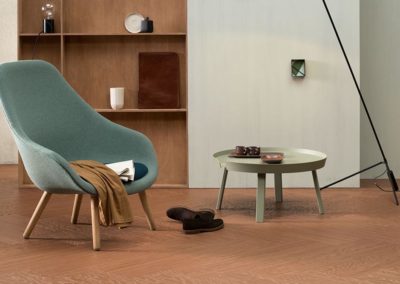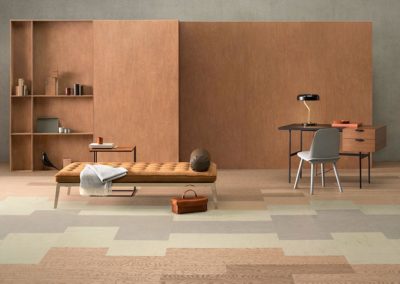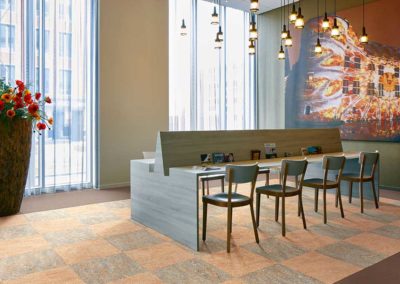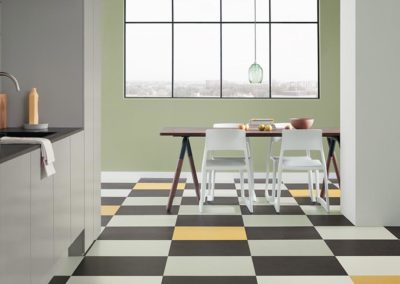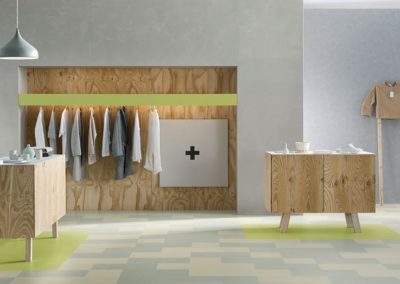Linoleum flooring - natural, beautiful, honest!
Linoleum flooring in many variations
It was known from hospitals or sports halls. But with its retro charm, linoleum flooring has long since found its way into private homes.
Linoleum is a floor covering that has been in use since 1860. It is made from up to 98 per cent natural raw materials, such as linseed oil, cork flour and jute. It is free from PVC, plasticisers, synthetic rubber or other chemical additives. Anyone who values an environmentally friendly floor is therefore ideally equipped with linoleum.
Advantages of linoleum flooring
Thanks to its unique composition, linoleum flooring offers many advantages: It is durable and very easy to clean, warm underfoot and sound-absorbent. It is often used in nurseries or sports halls thanks to its antistatic and impact-absorbing surface. Halls with large numbers of visitors also benefit from linoleum flooring. Its resilience prevents deformation of the floor even under heavy use.
Linoleum flooring is also a favourite in the healthcare sector. Thanks to its high linseed oil content, the floor prevents bacteria and other microorganisms from multiplying. Its ease of cleaning and maintenance is another plus point.
With our Premium partners Forbo Flooring and INKU, we can offer and install a wide range of different linoleum floors. We will find the perfect floor for you!
FAQ - Frequently asked questions about linoleum flooring
Is linoleum and PVC the same thing?
No, it is not! Although both variants are resilient floor coverings, the production process is different. While PVC is made from polyvinyl chloride, i.e. plastic, linoleum consists of up to 98 per cent natural raw materials such as linseed oil, jute or natural resins. Visually, the floors can look very similar, but linoleum is better suited to rooms with heavy traffic, such as sports halls, as it does not deform. PVC is more suitable for wet rooms due to its plastic material.
Is linoleum harmful?
As mainly natural products are used in the manufacture of linoleum, it is not harmful in everyday use and is free from plasticisers, toxic solvents or heavy metals. In fact, linoleum is the most ecological floor, as it is also biodegradable and therefore relatively easy to dispose of.
Which is better linoleum or vinyl?
At first glance, there are hardly any differences between the two floor coverings. The ease of maintenance, durability, slip resistance and joint protection are almost identical. One significant difference is the robustness of the flooring. While linoleum is extremely pressure-resistant and robust, the softer Vinyl flooring dents develop more quickly. Linoleum is therefore more suitable for rooms with high traffic. However, linoleum is less suitable for damp rooms, as the natural material can rot when exposed to high levels of moisture.
How do you get linoleum clean again?
Cleaning agents for linoleum floors should not have a pH value that is too high, as this can attack the raw materials of the floor. Abrasive cleaners or rough sponges should also be avoided so as not to scratch the floor. Water that is too hot can damage the floor structure.
It is best to clean the floor with special cleaning agents and warm water. As the surface is resistant to dirt, it is usually sufficient to clean with a broom.
How long does a linoleum floor last?
With the proper care linoleum can be used for up to 40 years.
Can linoleum go mouldy?
As linoleum is a natural product, it is sensitive to high levels of moisture. It is important that it is fully bonded and grouted, otherwise the floor may become mouldy or even disintegrate. This floor covering is therefore not the best alternative in damp rooms such as bathrooms.
Customer testimonials
.


